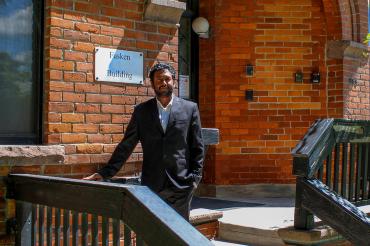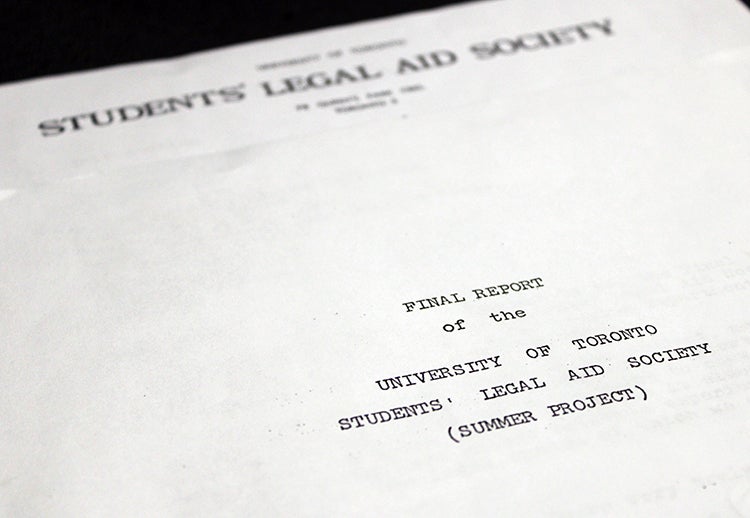Access to justice: Downtown Legal Services, U of T’s community legal clinic, celebrates 50 years

Published: October 21, 2022
More than half a century ago, a group of students from the University of Toronto’s Faculty of Law received funding for a summer project that would ultimately lay the groundwork for a free community legal clinic in Toronto.
Today, the Downtown Legal Services clinic offers free legal assistance to students and low-income members of the community in areas of law that include housing, family, employment, criminal, refugee and immigration.
Supervised by five staff lawyers and the clinic’s director, 100 student caseworkers and volunteers serve nearly 2,000 clients each year.
“That original spirit of improving access to justice carries on with the students who step into the clinic today,” says Prasanna Balasundaram, director of the community legal clinic and clinical legal education program at the Faculty of Law.
Balasundaram, who was among the lawyers representing refugees who helped strike down the Safe Third Country Agreement in a federal court in 2020, moderated an anniversary panel discussion this week with student caseworker Nina Patti and former client Rossana Ibarra. The panel explored how law students at the clinic “develop insights into the social reality of law and legal institutions while making a tremendous impact on the lives of clients,” Balasundaram says.
Patti, a second-year law student, says being a caseworker in the clinic’s employment law division has been a highlight of her law school experience, giving her valuable, hands-on experience. That includes negotiating a settlement at a Human Rights Tribunal of Ontario mediation, as well as representing a client before the Ontario Labour Relations Board.
“Without DLS, most of my clients would not have been otherwise able to access legal help, and I am proud to be part of an organization that provides such a needed service,” she says.

“A great University should concern itself with its neighbours,”wrote Charles F. Scott Jr. and Peter D. Quinn in a funding report.
The clinic has its roots in U of T’s Students’ Legal Aid Society (SLAS), which was established by U of T Law students in 1969.
During its first years of operation, the student legal aid society was an entirely student-led initiative, supported by faculty advisers and volunteer lawyers, and was recognized under Ontario’s then Legal Aid Act. The Students’ Administrative Council (now U of T Students' Union) provided two rooms for the society’s Campus Legal Assistance Centre (CLAC) on St. George Street. Ontario’s legal aid, by way of the “student defender” office in Old City Hall, distributed suitable cases that could be handled by law students at U of T’s Faculty of Law and York University’s Osgoode Hall Law School.
"This is in keeping with the idea that a great University should concern itself with its neighbours and not be restricted in its involvement with those immediately connected to it," wrote Charles F. Scott Jr. and Peter D. Quinn, members of the U of T Law class of 1972, in a report.
By the summer of 1971, the society also operated 16 community “clinics” in partnership with established social agencies, employing 23 law students who handled a total of 710 cases – from convictions to small claims court. After students petitioned University Professor Emeritus Martin L. Friedland, then the law school’s dean, to integrate the clinic into the law school’s curriculum for course credit, the faculty hired its first supervising staff lawyer: U of T Law graduate Richard “Dick” Gathercole.
Over the years, more than 5,000 alumni of the Faculty of Law have participated in the clinic, which is now housed in the Fasken building on Spadina Avenue.
They include U of T Law alumna Barbara Jackman – one of Canada’s eminent refugee and immigration lawyers – who says her clinic experience deeply influenced her career path.
“I went into law school thinking I would be a labour lawyer. [At law school] I realized immigrants had no representation,” she says. “It wasn't just me who went into immigration refugee law – a lot of people who went through this program stayed within ‘people law.’”
University Professor Emeritus Robert Prichard, who served as the sixth dean of the law school in the late 1980s and 13th president of U of T from 1990 to 2000, reflected on the clinic’s history as a former member of the SLAS executive in the early 1970s.
“The people involved in the SLAS were great. I remain very proud of my association with all of them,” Prichard says.
Rachel Bryce, a recent graduate from the Faculty of Law who is practising refugee and immigration lawyer, says the Downtown Legal Services clinic – which is funded for Downtown Legal Services by Legal Aid Ontario, the Law Foundation of Ontario, U of T’s Faculty of Law, U of T students and donations from U of T alumni and friends – was a highlight of her law school years.
“DLS is hands-down the best experience I've had at law school,” she says. “It offers the perfect mix of advocacy, activism, client counseling and legal work – and that opportunity is unparalleled.”



